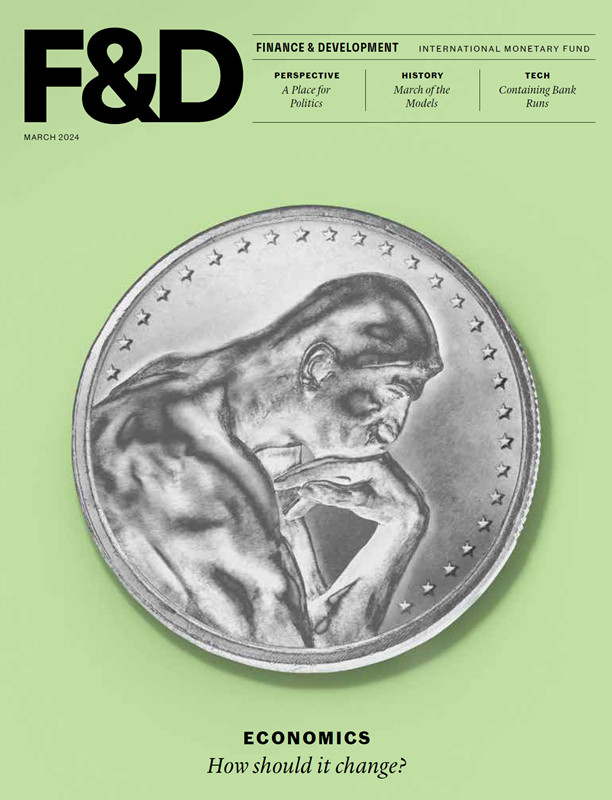A better regulatory environment will bring the Middle East more investment and innovation in digital finance
A young, educated, and growing population—and some of the world’s highest mobile, internet, and smartphone penetration rates—point to fertile ground for financial innovation in the Middle East and North Africa. Yet the region lags in the use of digital banking and the adoption of fintech. Seizing the massive opportunity ahead means overcoming substantial challenges, among them a protective approach to regulation.
Regulatory approaches differ by country, but this region generally has the greatest potential for reform among emerging market and developing economies, especially in domestic finance, the labor market, and governance regulations. Middle Eastern countries seeking to diversify their economies by engaging the private sector and reducing the role of the public sector, providing greater access to financial services, and accelerating foreign direct investment have no choice but to embrace financial innovation.
The Arab world enjoys a significant demographic advantage. A third of the population is under 30, and the massive shift to adulthood in the next decade calls for expansion of products and services that cater to new households. Many of these will be dual-income households as more women enter the workforce. This demographic shift also calls for economic diversification and growth to spur job creation. Those needs are behind the commitment of many regional governments, especially those in the Gulf region, to economic transformation. A demographic dividend in several economies, especially the large economies of Saudi Arabia and the United Arab Emirates, is increasingly possible, and the spillover could help others prosper. As we have witnessed in other emerging market economies, fintech has increased financial inclusion, a key economic growth enabler and accelerator.
The region’s embrace of mobile technology gives it substantial potential as a market for digital financial products, especially among young people, who have grown up with digital technology. One strong indication of burgeoning demand is the acceleration of noncash payments during the COVID-19 pandemic. In the United Arab Emirates noncash payments (a category that includes cardless payments) rose from 39 percent in 2018 to 73 percent in 2023.
Still, only 17 percent of consumers in the Middle East use digital banking compared with almost 60 percent in the United States. Fintech revenues are expected to increase from $1.5 billion in 2022 to $3.5–$4.5 billion by 2025 in the Middle East, North Africa, and Pakistan region as fintech in the banking sector grows from less than 1 percent to 2–2.5 percent. Some Middle Eastern countries could even achieve rates equal to those of other emerging market economies, such as Brazil’s 5–7 percent and Nigeria’s 12–15 percent.
Sacred ground
Among the biggest obstacles to financial innovation in the Middle East is a regional tradition of treating the financial sector as sacred ground. In most countries, banking institutions are owned primarily by the government, quasi-government institutions, or well-connected elites. Overly protective regulatory regimes favor incumbents and lead to entrenched national champions.
Banks in the Gulf Cooperation Council (GCC) countries, with strong balance sheets supported by government largesse, have been eager to expand. But, with limited opportunities in Gulf markets, they have gone farther afield to markets such as Türkiye, which are more open to acquisitions by foreign banks. Cross-border consolidation among GCC banks will likely not happen soon. For example, it’s hard to imagine Qatar National Bank obtaining regulatory approval to acquire a majority stake in a Saudi Arabian or Emirati bank. There is an uneasy tension within governments between wanting to expand financial innovation and inclusion and wanting to protect prized local banking champions. The entrenched dynamics of the banking sector mean that many fintech start-ups in the region are service providers or customer acquisition tools for established banking institutions rather than actual competitors. Fintech opportunity must be viewed through this prism.
Competing hubs
Middle Eastern countries are increasingly interested in building an ecosystem conducive to financial innovation, with several trying to become fintech hubs, including in Abu Dhabi, Bahrain, Dubai, and Riyadh. Unlike the United States, where the government provides room for exploration and growth before stepping in, Middle Eastern governments want to be at the center of financial innovation to assert control. Hence the approach of most fintech players in the region is to play nice with the government rather than heed Mark Zuckerberg’s call to “move fast and break things.”
This underlying approach needs reassessment. A top-down, government-led process rather than an industry-led approach to innovation will not yield globally competitive fintech companies or attract the best fintech companies to launch locally.
While we should acknowledge that risk mitigation and consumer protection are important, these factors need not inhibit financial innovation. Policymakers in the region must build the expertise and resources needed to regulate the fintech industry effectively. Allowing fintech companies to build without being overly regulated at the early stages will unleash more innovation.
Fintech in the United Arab Emirates is built primarily around the Abu Dhabi Global Market and Dubai International Financial Centre free zones; Bahrain and Saudi Arabia, however, have taken a consolidated central bank approach. With its large market, Saudi Arabia is well positioned to scale up fintech companies through enabling regulation. But even as each ecosystem focuses primarily on developing its comparative advantage, better interconnectivity and interoperability are essential in this fragmented region.
Market scalability will continue to be the most significant challenge to building globally competitive fintech start-ups from these regional hubs. We have yet to see pan-regional players emerge in substantial numbers.
Given the importance of volume in financial services, it’s hard to imagine the fintech sector thriving in a fragmented region. Can Jordan or Bahrain replicate Sweden’s success with the Klarna global payment and shopping system? Highly unlikely. Scalability in the region is very costly, and regulations are prohibitive. Most founders will confess that they cannot meet their growth targets and develop a sustainably profitable business model without a regional, multimarket approach.
Investment momentum at risk
Digitalization of financial services grew out of greater access to technology at lower cost thanks to innovations in digital infrastructure, such as cloud computing, and access to venture capital. With the emergence of artificial intelligence (AI), the potential to disrupt complex industries is more realistic than ever. AI levels the playing field further for all digital start-ups, especially those in fintech, which require sophisticated analysis of complex data sets with near-perfect accuracy because of the risks involved. What was once technologically challenging and prohibitively costly for many nascent companies may now be possible, thanks to AI language models.
Fintech has been the dominant sector for venture capital investment for the past three years and is expected to stay in the lead. Venture funding in fintech in the Middle East and North Africa region rose to $925 million in 2022 from $587 million in 2021, an increase of 58 percent. The funding in 2022 was across 131 deals compared with 124 deals in 2021: funding rounds are getting bigger. The sector’s share of venture funding increased from 21 percent in 2021 to 29 percent in 2022.
Payment start-ups dominated the initial wave of investment, unsurprising in a region where remittances and trading account for the bulk of economic activity. More recently, a more diversified set of start-ups has been funded in the region, including buy-now-pay-later start-ups Tabby and Tamara, open banking companies Lean Technologies and Tarabut Gateway, lending platforms for small and medium enterprises Lendo and Liwwa, and wealth management players Sarwa and Thndr.
However, venture funding has fallen short of predictions, and momentum may be slowing. As of the first quarter of 2023, deals and funding in the region recorded the lowest values since the start of the COVID pandemic. A 2019 Milken Institute report predicted that by 2022, 465 fintech companies in the Middle East would raise over $2 billion in venture capital funding, compared with only 30 start-ups that raised nearly $80 million in 2017. Clearly, the region is not realizing its potential for all the reasons previously discussed.
Policy action is necessary
Despite the challenges, regulators in the region recognize the potential for fintech to improve financial inclusion and economic growth and are committed to creating a favorable regulatory environment. Recent announcements from Saudi Arabia regarding its open banking framework and Egypt’s digital payment regulation are significant steps toward a better regulatory climate.
Several key policy actions are necessary to allow the fintech sector to achieve its full potential, keeping in mind the need for risk mitigation and customer protection:
- Leveling the playing field for incumbents, international players, and start-ups will lead to more dynamic and globally competitive players. Letting incumbents compete effectively will drive higher IT spending and innovation. Incumbents will be forced to improve their products and services to retain customers. Increased competition will also drive much-needed intracountry and intercountry mergers and acquisitions, facilitating the exit of successful start-ups’ venture capital and attracting capital for new venture funding in the sector.
- Regulatory harmonization will allow for easier and more effective market expansion for all players. Start-ups will still need licensing and permits, but increased regulatory transparency and public engagement will smooth geographic expansion. A further positive step would be allowing licensed players in one country to operate freely in another. Agreements between regulators in the various regional hubs would allow start-ups to expand geographically with little friction. Most important is acknowledgment that regional growth is not a zero-sum game and benefits all.
- Democratizing access to information is the key to an innovative fintech sector. Open banking regulations and comprehensive credit registries of potential borrowers will lower costs and foster more competition in products and services among a larger pool of companies.
- An expanded pool of investors in local venture capital is needed. In the Middle East and North Africa, venture capital financing declined 13 percent in 2023; the number of deals dropped by 55 percent. The region has tended to rely heavily on international funds to fill the gap in larger venture rounds. Excluding sovereign wealth funds and quasi-government entities, the number of local players able to fund the larger financing rounds necessary to transform and scale start-ups for regional and global competition is limited. There are just not enough international limited partners in the region to sustain the venture capital industry without government support. An active, diverse, and vast limited partner pool is essential. The ecosystem needs local and international institutional investors such as pension funds, endowments, foundations, insurance companies, and asset managers. Guarantee and incentive programs will attract these investors.
- Human capital development and immigration must be a top policy agenda item. Strong financial professionals are needed to build innovative start-ups and a capable regulatory environment. Finding individuals skilled in complex finance and technology is challenging in the Middle East. The region needs a three-pronged approach: nurture domestic talent through robust education system reform with a focus on aligning talent to knowledge industries; explore initiatives to improve the current workforce through public-private partnerships, targeted programs, and incentivizing the private sector; and launch long-term permanent visa programs and a path to citizenship, especially for talented expatriate professionals already in the region.
The world has witnessed fintech’s transformative nature and positive impact on financial inclusion, economic growth, consumer welfare, and cross-border investment and trade in developed and developing economies. Governments must seize the moment and implement the necessary reforms to ignite true fintech innovation in the region.
Opinions expressed in articles and other materials are those of the authors; they do not necessarily reflect IMF policy.









